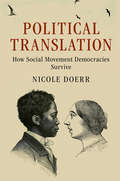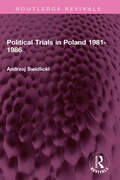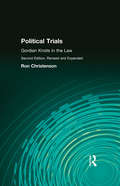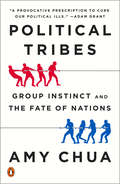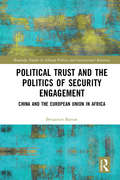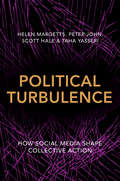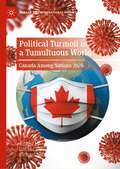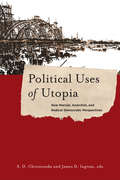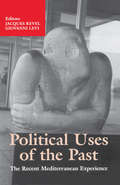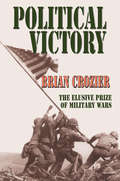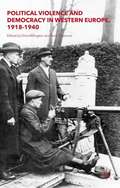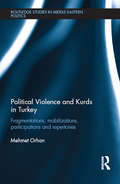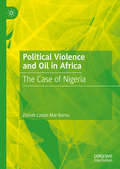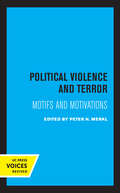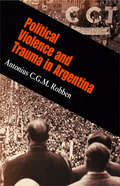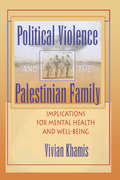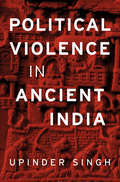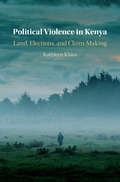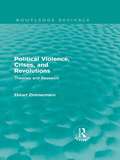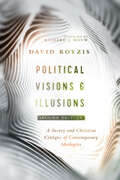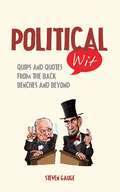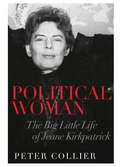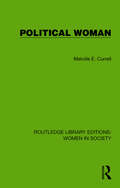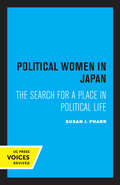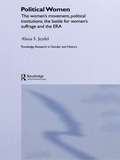- Table View
- List View
Political Translation: How Social Movement Democracies Survive (Cambridge Studies in Contentious Politics)
by Nicole DoerrAt a time when the legitimacy of democracies is in question, calls to improve the quality of public debate and deliberative democracy are sweeping the social sciences. Yet, real deliberation lies far from the deliberative ideal. Theorists have argued that linguistic and cultural differences foster inequality and impede democratic deliberation. In this empirical study, the author presents the collective practices of political translation, which help multilingual and culturally diverse groups work together more democratically than homogeneous groups. Political translation, distinct from linguistic translation, is a set of disruptive and communicative practices developed by activists and grassroots community organizers in order to address inequities hindering democratic deliberation and to entreat powerful groups to work together more inclusively with disempowered groups. Based on ten years of fieldwork, Political Translation provides the first systematic comparative study of deliberation under conditions of linguistic difference and cultural misunderstandings.
Political Trials in Poland 1981-1986 (Routledge Revivals)
by Andrzej SwidlickiFirst published in 1988, Political Trials in Poland 1981-1986 describes the major political trials which took place in Poland between 1981 and 1986. Based on extensive original research using both official and unofficial information from Poland and interviews with Solidarity activists, it shows how the trials constituted an attempt by the Jaruzelski regime to break the back of the independent Solidarity movement by judicial and penal measures. It discusses how the authorities abused the law and how the law itself leaves much to be desired and it charts the different human rights that were violated in each case. It considers the implications of the abuse of law in this way for the rule of law and the image of the state in communist countries. This book will be of interest to students of history and political science.
Political Trials: Gordian Knots in the Law
by Ron Christenson"Political trials take issues of responsibility, conscience, representation, and legitimacy, which are tied in tight political and legal knots, and force us to face questions about our public identity, our standards for public policy, and our sense of history. Ron Christenson explores how political trials, especially those within the rule of law, engage society's conflicting values and loyalties. He examines numerous political trials throughout history, bringing into question basic foundations of law, politics, and society. Christenson classifies political trials according to the issues they generate in the political sphere: partisan trials are spurious legal proceedings but politically expedient; trials of corruption and insanity raise questions of public and personal responsibility; trials of dissenters involve problems of conscience; trials of nationalists highlight the nature of representation and the relationship of the part to the whole; and trials of regimes engage the most fundamental concept of both law and politics--legitimacy. Political Trials brings these considerations to bear on some of the best-known cases in history, including the Gunpowder Plot; the Spanish Inquisition; the Dreyfus affair; the Nuremburg trials; trials of dissenters such as Socrates, Thomas More, Roger Williams, and the Berrigan brothers; and trials of nationalists such as Joan of Arc, Gandhi, Knut Hamsun, and the Irish republicans. Since the first edition appeared, a number of notable political trials have raised critical issues for society. Shocking public exposures about the Guildford 4 and Maguire 7 trials shook the British criminal justice establishment, while in the United States trials concerning the beating of Rodney King led up to the O.J. Simpson spectacle and a host of parallel questions. The trials of right-wing terrorists such as Paul Hill, found guilty of murdering an abortion doctor, and Timothy McVeigh, convicted of the Oklahoma City federal building bombing, parallel "
Political Tribes: Group Instinct and the Fate of Nations
by Amy ChuaThe bestselling author of Battle Hymn of the Tiger Mother, Yale Law School Professor Amy Chua offers a bold new prescription for reversing our foreign policy failures and overcoming our destructive political tribalism at home Humans are tribal. We need to belong to groups. In many parts of the world, the group identities that matter most – the ones that people will kill and die for – are ethnic, religious, sectarian, or clan-based. But because America tends to see the world in terms of nation-states engaged in great ideological battles – Capitalism vs. Communism, Democracy vs. Authoritarianism, the “Free World” vs. the “Axis of Evil” – we are often spectacularly blind to the power of tribal politics. Time and again this blindness has undermined American foreign policy. In the Vietnam War, viewing the conflict through Cold War blinders, we never saw that most of Vietnam’s “capitalists” were members of the hated Chinese minority. Every pro-free-market move we made helped turn the Vietnamese people against us. In Iraq, we were stunningly dismissive of the hatred between that country’s Sunnis and Shias. If we want to get our foreign policy right – so as to not be perpetually caught off guard and fighting unwinnable wars – the United States has to come to grips with political tribalism abroad. Just as Washington’s foreign policy establishment has been blind to the power of tribal politics outside the country, so too have American political elites been oblivious to the group identities that matter most to ordinary Americans – and that are tearing the United States apart. As the stunning rise of Donald Trump laid bare, identity politics have seized both the American left and right in an especially dangerous, racially inflected way. In America today, every group feels threatened: whites and blacks, Latinos and Asians, men and women, liberals and conservatives, and so on. There is a pervasive sense of collective persecution and discrimination. On the left, this has given rise to increasingly radical and exclusionary rhetoric of privilege and cultural appropriation. On the right, it has fueled a disturbing rise in xenophobia and white nationalism. In characteristically persuasive style, Amy Chua argues that America must rediscover a national identity that transcends our political tribes. Enough false slogans of unity, which are just another form of divisiveness. It is time for a more difficult unity that acknowledges the reality of group differences and fights the deep inequities that divide us.
Political Trust and the Politics of Security Engagement: China and the European Union in Africa (Routledge Studies in African Politics and International Relations)
by Benjamin BartonThe EU and China are often characterised as parties whose bilateral political differences still remain too large to bridge, so that they have failed to convert rhetorical promises into tangible results of cooperation, particularly with regards to the field of international security. Yet in terms of their bilateral interaction on security risk management in Africa; EU and Chinese naval officers jointly brought down the number of successful Somali pirate attacks in the Gulf of Aden and to a lesser extent were jointly involved in seeking a resolution to the lingering conflict in Darfur. This book asks how we can make sense as a whole of this relatively sudden shift in regards to the dealings between their respective officials on the topic of security risk management. It argues that the outcomes of Sino-European bilateral dealings on this topic are above all determined by the ability/inability of these officials to build political trust as a complex and cognitive social phenomenon. Consequently, the book applies an innovative conceptual framework on political trust to explain why EU and Chinese officials bridged their ‘endemic’ political differences to practically cooperate on Somali piracy but were unable to do so when it came to their interaction on Darfur. To conclude, it examines the longer term impact of this bilateral trust-building process by covering more recent examples of bilateral engagement in Libya and Mali and aims to show that although this trust-building process may be case specific, ramifications may go beyond the realm of their bilateral dealings on security matters in Africa, to impact wider issues of international security. This text will be of key interest to scholars and students of African and Chinese politics, EU politics, security and maritime studies, and more broadly of international relations and to governmental actors.
Political Turbulence
by Peter John Scott Hale Helen Margetts Taha YasseriAs people spend increasing proportions of their daily lives using social media, such as Twitter and Facebook, they are being invited to support myriad political causes by sharing, liking, endorsing, or downloading. Chain reactions caused by these tiny acts of participation form a growing part of collective action today, from neighborhood campaigns to global political movements. Political Turbulence reveals that, in fact, most attempts at collective action online do not succeed, but some give rise to huge mobilizations--even revolutions. Drawing on large-scale data generated from the Internet and real-world events, this book shows how mobilizations that succeed are unpredictable, unstable, and often unsustainable. To better understand this unruly new force in the political world, the authors use experiments that test how social media influence citizens deciding whether or not to participate. They show how different personality types react to social influences and identify which types of people are willing to participate at an early stage in a mobilization when there are few supporters or signals of viability. The authors argue that pluralism is the model of democracy that is emerging in the social media age--not the ordered, organized vision of early pluralists, but a chaotic, turbulent form of politics. This book demonstrates how data science and experimentation with social data can provide a methodological toolkit for understanding, shaping, and perhaps even predicting the outcomes of this democratic turbulence.
Political Turmoil in a Tumultuous World: Canada Among Nations 2020 (Canada and International Affairs)
by David Carment Richard NimijeanIn the last two years, Canadian society has been marked by political and ideological turmoil. How does an increasingly divided country engage a world that is itself divided and tumultuous? Political instability has been reinforced by international uncertainty: the COVID-19 pandemic, populism, Black Lives Matter, and the chaotic final year of the Trump presidency that increased tensions between the West, China and Russia. Even with a Biden presidency, these issues will continue to influence Canada’s domestic situation and its ability to engage as an effective global actor. Contributors explore issues that cause or reflect these tensions, such as Canada’s willingness to address pressing crises through multilateralism, including the COVID-19 pandemic. Can Canada forge its own path in a turbulent world?
Political Uses of Utopia: New Marxist, Anarchist, and Radical Democratic Perspectives (New Directions in Critical Theory #26)
by James D. Ingram Edited by S. D. ChrostowskaUtopia has long been banished from political theory, framed as an impossible—and possibly dangerous—political ideal, a flawed social blueprint, or a thought experiment without any practical import. Even the "realistic utopias" of liberal theory strike many as wishful thinking. Can politics think utopia otherwise? Can utopian thinking contribute to the renewal of politics?In Political Uses of Utopia, an international cast of leading and emerging theorists agree that the uses of utopia for politics are multiple and nuanced and lie somewhere between—or, better yet, beyond—the mainstream caution against it and the conviction that another, better world ought to be possible. Representing a range of perspectives on the grand tradition of Western utopianism, which extends back half a millennium and perhaps as far as Plato, these essays are united in their interest in the relevance of utopianism to specific historical and contemporary political contexts. Featuring contributions from Miguel Abensour, Étienne Balibar, Raymond Geuss, and Jacques Rancière, among others, Political Uses of Utopia reopens the question of whether and how utopianism can inform political thinking and action today.
Political Uses of the Past: The Recent Mediterranean Experiences (A\special Issue Of Mediterranean Historical Review Ser.)
by Jacques Revel Giovanni LeviThis work addresses political and historiographical uses of history. A group of leading historians and thinkers discuss questions of collective identity and representation in relation to the fluctuating concept of "Past" and its changing relevance. Among the topics are Greek historiographical questions, Balkan history, the Armenian problem, and the Plaestine historical narrative.
Political Victory: The Elusive Prize of Military Wars
by Brian CrozierSuccess in war has always been difficult to measure. What is judged successful by military leaders may not be judged so by political leadership, nor by the wider public, at least in a Western-style democracy. The public is generally inclined to applaud military victory, but it instinctively reserves the right to ask afterwards: Was it really worth it? In Political Victory, Brian Crozier looks at modern wars involving democracies to evaluate victory and defeat by the success or failure of political outcomes.Crozier begins with the two world wars, where in both cases the German aggressor was defeated by three key democracies: the United States, the United Kingdom, and France. In World War I military victory was squandered by treaty terms that led to the advent of Hitler and Nazism. By contrast, the total defeat of Nazism in 1945 left the Western Allies in charge of some two-thirds of Germany's population, thus enabling the victors to convert the vanquished to democracy. Crozier also deals with the break up of empires following World War II, comparing how Britain avoided full-scale war in contrast with France's violent confrontations in Southeast Asia and Algeria.America's involvement in Vietnam is analyzed in the wider context of the Cold War and the mounting challenge of international communism to Western democracies. His assessment stresses the lack of popularity in America for the idea of democratizing a region to which the U.S. has no historical or sentimental attachment. Among the smaller conflicts considered in this volume are the Suez crisis of 1956, the Falkland Island war between Britain and Argentina, and the fateful Soviet involvement in Afghanistan that helped bring about the collapse of the Soviet system. Crozier concludes with analyses of the 1991 Gulf War and the Western intervention in the former Yugoslavia.Crozier's final chapters focus on looming threats around the world with particular emphasis on international terrorism and the challenge of radical Islam. Both historical and timely, Political Victory will be of interest to military historians, political scientists, and foreign affairs specialists.
Political Violence and Democracy in Western Europe, 1918�1940
by Kevin Passmore Chris MillingtonThe contributions in this collection explore manifestations of political violence in the democracies of interwar Europe. While research in this area usually focuses on the regimes that fell to fascism, Political Violence and Democracy in Western Europe, 1918-1940 demonstrates that violence remained a part of political competition in the democratic regimes of Western Europe too. Left-wing and right-wing ideas and uses of violence are examined in countries such as Britain, France, Belgium, the Netherlands, as well as in Italy and Germany. By assembling the latest research in the field it demonstrates that democracy does not necessarily provide an antidote to violent political conflict.
Political Violence and Kurds in Turkey: Fragmentations, Mobilizations, Participations & Repertoires (Routledge Studies in Middle Eastern Politics)
by Mehmet OrhanThe Kurdish conflict is an acknowledged long-standing issue in the Middle East, and the emergence of radical Kurdish nationalist movements in the 20th century played a decisive role in the evolution of political violence. Political Violence and Kurds in Turkey examines how this political violence impacts Kurds in contemporary Turkey, and explores the circumstances that move human beings to violent acts. It looks at the forms political violence takes and in which times and spaces it occurs, as well as the roles played by micro and macro factors. It takes a theoretical approach to violence, as both producer and product of interrelations between many actors, and contextualises this with studies of violence in Kurdish villages and towns. The book evaluates the three levels at which political violence operates; between the state and Kurdish movements, among Kurdish groups and between Kurdish political organizations and Kurdish society, and divides it into its different aspects and processes; fragmentation-segmentation (signifying intra-ethnic struggles between Kurdish actors), mobilization (the course leading the Kurdish movement to armed conflict), participation (the use of violence by individuals) and repertoires (the forms taken by political violence). Offering an in-depth analysis of the dynamics behind political violence and its use amongst Kurds in Turkey, this book will be a key resource for students and scholars of Middle Eastern, Kurdish Studies and Conflict Studies, and offers new understanding and approaches to the study of political violence.
Political Violence and Oil in Africa: The Case of Nigeria
by Zainab Ladan Mai-BornuThe book argues that in order to better understand the undercurrents of the Niger Delta conflict, it is imperative to analyse the dynamics of choice in terms of the distinct courses of action taken by the Ogoni and Ijaw. Given the similar structural constraints, the author considers why the Ogoni adopted nonviolent resistance, and the Ijaw violent resistance. This book is divided into seven chapters starting with an introduction to oil and political violence in African conflicts, and includes a synoptic overview of four other resource-rich countries in Africa. Theoretical and conceptual underpinnings of conflict are then presented with the aim of situating the Niger Delta conflicts within the wider conflict literature. Chapter Three concentrates the discussion on the Nigerian Niger Delta, outlining the core issues at the centre of the contestations. The following three chapters offer an in-depth empirical analysis on the interaction between the narratives on nonviolence versus violence, the nature of leadership styles, and the organisation of the Ogoni and Ijaw movements along with a concluding chapter.
Political Violence and Terror: Motifs and Motivations
by Peter H. MerklThis title is part of UC Press's Voices Revived program, which commemorates University of California Press’s mission to seek out and cultivate the brightest minds and give them voice, reach, and impact. Drawing on a backlist dating to 1893, Voices Revived makes high-quality, peer-reviewed scholarship accessible once again using print-on-demand technology. This title was originally published in 1986.
Political Violence and Trauma in Argentina (The Ethnography of Political Violence)
by Antonius C. RobbenFor decades, Argentina's population was subject to human rights violations ranging from the merely disruptive to the abominable. Violence pervaded Argentine social and cultural life in the repression of protest crowds, a ruthless counterinsurgency campaign, massive numbers of abductions, instances of torture, and innumerable assassinations. Despite continued repression, thousands of parents searched for their disappeared children, staging street protests that eventually marshaled international support. Challenging the notion that violence simply breeds more violence, Antonius C. G. M. Robben's provocative study argues that in Argentina violence led to trauma, and that trauma bred more violence.In this work of superior scholarship, Robben analyzes the historical dynamic through which Argentina became entangled in a web of violence spun out of repeated traumatization of political adversaries. This violence-trauma-violence cycle culminated in a cultural war that "disappeared" more than ten thousand people and caused millions to live in fear. Political Violence and Trauma in Argentina demonstrates through a groundbreaking multilevel analysis the process by which different historical strands of violence coalesced during the 1970s into an all-out military assault on Argentine society and culture.Combining history and anthropology, this compelling book rests on thorough archival research; participant observation of mass demonstrations, exhumations, and reburials; gripping interviews with military officers, guerrilla commanders, human rights leaders, and former disappeared captives. Robben's penetrating analysis of the trauma of Argentine society is of great importance for our understanding of other societies undergoing similar crimes against humanity.
Political Violence and the Palestinian Family: Implications for Mental Health and Well-Being
by Vivian KhamisWhat has political occupation done to Palestinian family life in the West Bank, Jerusalem, and the Gaza Strip?A psychological study of family members affected by unrest, Political Violence and the Palestinian Family: Implications for Mental Health and Well-Being examines families living in the midst of the conflict in the Middle East to help mental health professionals, social scientists, counselors, and students in these fields create appropriate intervention methods and provide relevant and effective services. Discussing coping, social support, ideology, and the sociopolitical conditions of Palestinian families, this comprehensive guide is the first book that specifically focuses on Palestinians. Political Violence and the Palestinian Family combines quantitative and qualitative research to clarify the sociological and psychological impacts upon Palestinian family life in the wake of the Intifada (the Palestinian uprising against Israeli occupation). This book depicts the human cost of Israeli occupation on this population and the failure of the Palestinian Authority to ameliorate the effects of violence on this society.Political Violence and the Palestinian Family discusses: political victimization and how it affects families the psychiatric symptomatology of Palestinians the psychological and somatic sequelae of political trauma techniques for successful sessions with Palestinian clients appraisal and coping techniques the values and beliefs of PalestiniansPolitical Violence and the Palestinian Family: Implications for Mental Health and Well-Being will help mental health professionals, social scientists, counselors, and students create appropriate intervention methods and provide relevant and effective services to Palestinian clients.
Political Violence in Ancient India
by Upinder SinghGandhi and Nehru helped create a myth of nonviolence in ancient India that obscures a troubled, complex heritage: a long struggle to reconcile the ethics of nonviolence with the need to use violence to rule. Upinder Singh documents the tension between violence and nonviolence in ancient Indian political thought and practice, 600 BCE to 600 CE.
Political Violence in Kenya: Land, Elections, and Claim-Making
by Kathleen KlausExamining a key puzzle in the study of electoral violence, this study asks how elites organize violence and why ordinary citizens participate. While existing theories of electoral violence emphasize weak institutions, ethnic cleavages, and the strategic use of violence, few specify how the political incentives of elites interact with the interests of ordinary citizens. Providing a new theory of electoral violence, Kathleen F. Klaus analyzes violence as a process of mobilization that requires coordination between elites and ordinary citizens. Drawing on fifteen months of fieldwork in Kenya, including hundreds of interviews and an original survey, Political Violence in Kenya argues that where land shapes livelihood and identity, and tenure institutions are weak, land, and narratives around land, serve as a key device around which elites and citizens coordinate the use of violence. By examining local-level variation during Kenya's 2007–8 post-election violence, Klaus demonstrates how land struggles structure the dynamics of contentious politics and violence.
Political Violence, Crises and Revolutions: Theories and Research (Routledge Revivals)
by Ekkart ZimmermannFirst published in 1983, this extraordinary study provides a comprehensive systematic evaluation of cross-national theorizing and quantitative empirical evidence on four interrelated phenomena: Political violence Crises Military Coups D’ État Revolutions. Findings from social-psychological research on aggression are integrated in this outstanding study, as well as results reported in social-historical studies of revolution. The focus of the book is always on analytical perspectives and corresponding empirical evidence. The author continually highlights the sociostructural and political conditions of political violence, crises and revolutions. This exceptionally detailed and systematic inventory of theories and research on a classic triad of political science (political violence, crises and revolutions) also includes a remarkable bibliography encompassing over 3000 items.
Political Visions & Illusions: A Survey & Christian Critique of Contemporary Ideologies
by David T. KoyzisWhat you believe about politics matters. The decades since the Cold War, with new alignments of post–9/11 global politics and the chaos of the late 2010s, are swirling with alternative visions of political life, ranging from ethnic nationalism to individualistic liberalism. Political ideologies are not merely a matter of governmental efficacy, but are intrinsically and inescapably religious: each carries certain assumptions about the nature of reality, individuals and society, as well as a particular vision for the common good. These fundamental beliefs transcend the political sphere, and the astute Christian observer can discern the ways—sometimes subtle, sometimes not—in which ideologies are rooted in idolatrous worldviews. In this freshly updated, comprehensive study, political scientist David Koyzis surveys the key political ideologies of our era, including liberalism, conservatism, nationalism, democracy, and socialism. Koyzis gives each philosophy careful analysis and fair critique, unpacking the worldview issues inherent to each and pointing out essential strengths and weaknesses, as well as revealing the "narrative structure" of each—the stories they tell to make sense of public life and the direction of history. Koyzis concludes by proposing alternative models that flow out of Christianity's historic engagement with the public square, retrieving approaches for both individuals and the global, institutional church that hold promise for the complex political realities of the twenty-first century. Writing with broad international perspective and keen analytical insight, Koyzis is a sane and sensible guide for Christians working in the public square, culture watchers, political pundits, and all students of modern political thought.
Political Wit: Quips and Quotes from the Back Benches and Beyond (Wit Ser.)
by Steven GaugeOrder, order! After a long day at the dispatch box, when your honourable friend’s white paper has made you feel green and your poll ratings have slumped to a new low, hunker down in Speakers’ Corner with this grand coalition of political quips and quotes – you’ll be ready to take on the opposition at any time!
Political Woman
by Peter CollierThis is the first and only biography of Jeane Kirkpatrick, who became an iconic figure in the 1980s as Ronald Reagan's UN ambassador and the most forceful presence in the administration, outside of the President himself, in shaping the Reagan Doctrine and fighting the Cold War to a victorious conclusion.Political Woman traces the complex interlock between Kirkpatrick's personal and professional lives using her as yet unarchived private papers and extensive interviews with her and her family and with dozens of friends and associates. The portrait that emerges, filled with character and anecdote, is of an ambitious woman from the epicenter of middle America determined to break through the multi dimensional glass ceilings of her time and place.A pioneering feminist who would be hated by the feminist movement because of her association with Reagan and neo conservatism, she began her career in the post war period as an academic focusing on the subject of totalitarianism. She fell in love with a married man, Evron Kirkpatrick, who had been a close aide to "Wild Bill" Donovan in the wartime OSS and who would help form the CIA after the war.A leading professor at Georgetown, she also became an important Democratic Party activist. Dismayed by what she saw as McGovern's trashing of the Roosevelt coalition and by Carter's capitulation to Soviet advances, she led a group of Democratic liberals who felt homeless in the radicalized and "Blame America First" (a phrase from her famous 1984 Republican convention speech) Party into the Reagan administration. As Reagan's UN representative, Jeanette sharpened the spearpoint of a rearmed America ready to join the final battle of the Cold War, in the process staging dramatic battles with figures like Alexander Haig and George Schultz over policy toward the Soviets, the Cubans, and the Contras.This book tells this parallel story--the flight of centrist liberals out of the Democratic Party and into neoconservatism and the complex chess match of the end game of the Cold War--through the intimate story of a woman who was at the center of these interconnected dramas and who kept resurfacing until her death in 2006, most notably for posthumously breaking ranks with her fellow neoconservatives on the war in Iraq. It also shows the price she paid for her achievements in a private life filled with sorrow and loss as profound as her epic personal achievements.
Political Woman (Routledge Library Editions: Women in Society)
by Melville E. CurrellOriginally published in 1974, Political Woman explains why women had participated so little in the British political elite at the time. To many, the question was familiar and the facts plain. Melville Currell in an objective way analyses and attempts to answer the question, ‘Why so few?’The book begins with a brief survey of women’s political activity before enfranchisement. It continues by tracing the assimilation of women into the various levels of political activism, as ‘the late comers’ to the political scene, and compares them with their immediate predecessors, working class men.The author looks for answers in two areas to the basic question posed in the book. She had conducted empirically based studies of the relatively few women activists, and analysed the more general factors including political and sociological considerations. The women she studied are those who had ever been elected to Parliament, and the aspirants, the ‘volunteers’ i.e. the Prospective Parliamentary Candidates. She looked not only at their background characteristics and career patterns, but at how they perceived the political role of women.In addition, she evaluated factors which may have been regarded as militating, or mediating women’s entry into the political elite, like woman’s changing role in society, her status in the educational and occupational sectors, the political socialization process as it affected women and girls, and the incidence of two factors which may be termed ‘male equivalence’, and ‘the politicized family’. Candidate selection in the parties is also briefly considered.Two chapters place women’s political activism in Britain in a wider framework. In terms of a wider regional context, the comparative political role of women is outlined, an outline which includes material from Western Europe and from the Communist sector. In the search for a wider definition of ‘political’, a chapter is devoted to the rise and relevance of the Women’s Liberation Movement.
Political Women in Japan: The Search for a Place in Political Life
by Susan J. PharrDrawing on interviews with one hundred young Japanese women engaged in a spectrum of voluntary political groups, Susan J. Pharr explores how politically active women overcome the constraints that bar or limit the political participation of the average woman. The book treats political volunteers as agents of social change in a process of role redefinition by which prevailing concepts of women's roles gradually adjust to accommodate political behavior. Tracing developments that led to the grant of suffrage and other political rights to women during the Allied occupation, Pharr sets the stage for an analysis of that process as it unfolds in the experience of individual women. She uses women's images of self and society and issues of political and gender role socialization, career and life expectations, and political role and participation to develop a three-fold typology for looking at political women in Japan. She examines both the satisfactions of political volunteerism—from the exhilaration of addressing a crowd from a sound truck to the pleasure of speaking "men's language"—and the psychological and social costs associated with it. This title is part of UC Press's Voices Revived program, which commemorates University of California Press’s mission to seek out and cultivate the brightest minds and give them voice, reach, and impact. Drawing on a backlist dating to 1893, Voices Revived makes high-quality, peer-reviewed scholarship accessible once again using print-on-demand technology. This title was originally published in 1981.
Political Women: The Women's Movement, Political Institutions, the Battle for Women's Suffrage and the ERA (Routledge Research in Gender and History)
by Alana JeydelUnder what conditions are political elites responsive to social movements, and when do social movements gain access to political elites? This book explores this question with regard to the women's movement in the US, asking under what conditions are Congress and the presidency responsive to the women's movement, and when will the women's movement gain access to Congress and the presidency?The book systematically compares the relation between political leaders and each of the three waves of the women's movement, 1848-1889, 1890-1928, and 1960-1985, in light of the political dynamics that each wave faced. The author utilizes perspectives and methods from the fields of Political Science, Sociology, and History to illustrate the ways in which changing political dynamics impacted the battle for both women's suffrage and the Equal Rights Amendment.A significant addition to the study of women's history and American studies, Political Women illlustrates the important roles that political leaders played in the battle for women's suffrage and the ERA and demonstrates the political savvy among women suffrage activists who recognized the institutional barriers present in the US political system and fought to overcome them.
